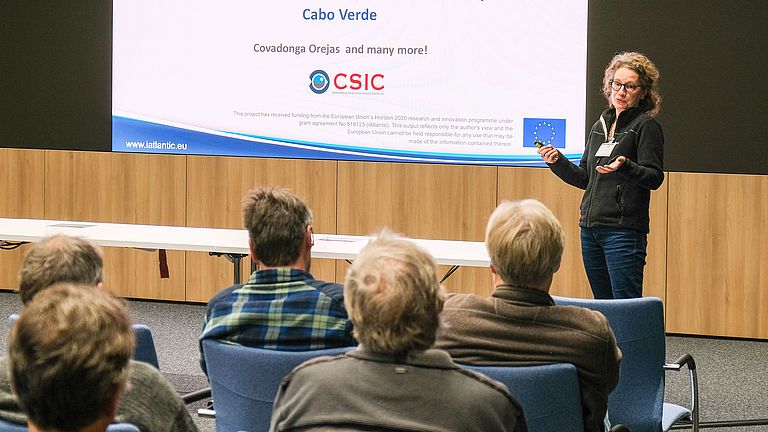Holistic Perspectives on Coastal Upwelling Systems
First interdisciplinary Kiel symposium on upwelling organised by GEOMAR and Kiel University
Coastal upwelling, a phenomenon that occurs mainly at the eastern margins of subtropical oceans, is caused by the interaction of trade winds parallel to the coast and internal waves, which cause cold and nutrient-rich water from deeper layers to rise to the surface. Although this occurs over only about 1-2% of the ocean's surface, coastal upwelling areas are among the most biologically productive marine regions in the world. Providing about 25% of the world's fisheries, they play a vital role in the food supply of neighbouring countries and make a significant contribution to global nutrition.
The study of coastal upwelling areas spans a wide range of natural and social science disciplines and covers for example physical processes as well as the flora and fauna of these regions. Current research also focuses on the effects of upwelling on the geology of the seafloor and biochemical processes, such as the development of oxygen minimum zones or the influence on the carbon cycle. Economic, sociological, administrative and political aspects are also closely linked to upwelling areas.
In Kiel, there are a large number of representatives from all these disciplines who are researching the topic at the highest level. In order to bring together this expertise, Dr Florian Schütte, Professor of Physical Oceanography in the Research Field Ocean Circulation and Climate Dynamics at GEOMAR Helmholtz Centre for Ocean Research Kiel, invited researchers from different Kiel institutes to a symposium. All four research divisions of GEOMAR, where "Upwelling in the Atlantic Ocean" is an important research focus within the GEOMAR 2030 strategy, were represented, as well as the departments of Marine Climate Research, Marine Geophysics, Data Science and Political Economy of the Kiel University, the State Office for the Environment of Schleswig-Holstein and a representative of the Spanish Oceanographic Institute (Instituto Español de Oceanografía, IEO-CSIC). The meeting took place in the context of FUTURO, a planned international project with a year-long large-scale experiment in West Africa, initiated and coordinated by GEOMAR.
"Our interdisciplinary meeting allows us to get a more comprehensive view of the topic," says Dr Schütte. "Knowing the perspectives and approaches of other scientific disciplines and being well connected makes it easier to shape future research activities across disciplines." He is in no doubt that this is urgently needed. Dr Florian Schütte emphasises: "In tropical upwelling regions, everything is interconnected. Because they play such a crucial role in the Earth system and are simultaneously threatened by climate change, fishing pressure and pollution, only multidisciplinary research can help to describe these changes and address important questions for the future".
![[Translate to English:] A conference room with an audience, a man stands at the front of the screen and speaks](/fileadmin/_processed_/8/e/csm_2023-11-27_Coastal-Upwelling_Bjoern-Fiedler_64c50c210f.jpg)
Kiel researchers from a wide range of disciplines met at GEOMAR to develop a holistic perspective on coastal upwelling areas. Photo: Björn Fiedler, GEOMAR

Dr Covadonga Orejas, biologist at the Spanish Oceanographic Institute, presented the different approaches to studying the ecology of the seabed off the Cape Verde Islands. Photo: Ilka Thomsen, GEOMAR


